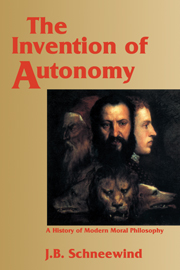Book contents
- Frontmatter
- Contents
- Preface
- Acknowledgments
- A note on references and abbreviations
- Introduction
- Part I The rise and fall of modern natural law
- Part II Perfectionism and rationality
- Part III Toward a world on its own
- Part IV Autonomy and divine order
- 20 Perfection and will: Wolff and Crusius
- 21 Religion, morality, and reform
- 22 The invention of autonomy
- 23 Kant in the history of moral philosophy
- Epilogue
- Bibliography
- Index of names
- Index of subjects
- Index of biblical citations
23 - Kant in the history of moral philosophy
Published online by Cambridge University Press: 05 June 2012
- Frontmatter
- Contents
- Preface
- Acknowledgments
- A note on references and abbreviations
- Introduction
- Part I The rise and fall of modern natural law
- Part II Perfectionism and rationality
- Part III Toward a world on its own
- Part IV Autonomy and divine order
- 20 Perfection and will: Wolff and Crusius
- 21 Religion, morality, and reform
- 22 The invention of autonomy
- 23 Kant in the history of moral philosophy
- Epilogue
- Bibliography
- Index of names
- Index of subjects
- Index of biblical citations
Summary
Stäudlin held that Kant single-handedly created a revolution in moral philosophy. “When Kant came on the scene,” he said,
it had become the ruling tendency in Germany to derive not only morality but religion and Christianity from the principle of happiness. Everyone started with the natural drive to happiness and found in it a guide to all duties and virtues … Kant let his dissatisfaction with this be known in 1763. … Since the year 1785 [with the publication of the Foundations] he has begun a new era in the history of moral philosophy … a revolution in the philosophical investigation of morality.
Stäudlin's belief, and ours, that Kant was a profound innovator is by no means unwarranted, but his statement is less than helpful in showing exactly where and how he altered moral philosophy. Numbers of philosophers had indeed claimed that happiness would guide us to all duties and virtues. But Kant was not revolutionary in rejecting such views. As we have seen, and as Stäudlin knew perfectly well, others, even in Germany, had done so. Stäudlin was a Kantian, trying to ensure recognition of his master's originality. I hope to be somewhat less partisan in discussing what Kant did with the problems and options that his predecessors and contemporaries considered part of moral philosophy.
- Type
- Chapter
- Information
- The Invention of AutonomyA History of Modern Moral Philosophy, pp. 508 - 530Publisher: Cambridge University PressPrint publication year: 1997

